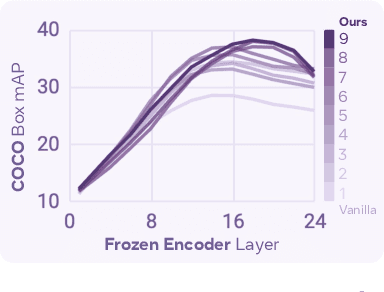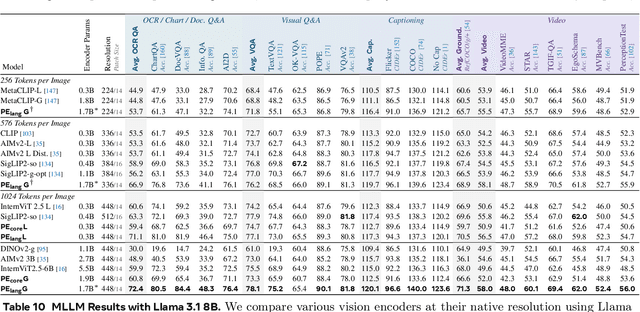Shiyu Dong
Perception Encoder: The best visual embeddings are not at the output of the network
Apr 17, 2025



Abstract:We introduce Perception Encoder (PE), a state-of-the-art encoder for image and video understanding trained via simple vision-language learning. Traditionally, vision encoders have relied on a variety of pretraining objectives, each tailored to specific downstream tasks such as classification, captioning, or localization. Surprisingly, after scaling our carefully tuned image pretraining recipe and refining with our robust video data engine, we find that contrastive vision-language training alone can produce strong, general embeddings for all of these downstream tasks. There is only one caveat: these embeddings are hidden within the intermediate layers of the network. To draw them out, we introduce two alignment methods, language alignment for multimodal language modeling, and spatial alignment for dense prediction. Together with the core contrastive checkpoint, our PE family of models achieves state-of-the-art performance on a wide variety of tasks, including zero-shot image and video classification and retrieval; document, image, and video Q&A; and spatial tasks such as detection, depth estimation, and tracking. To foster further research, we are releasing our models, code, and a novel dataset of synthetically and human-annotated videos.
UniPlane: Unified Plane Detection and Reconstruction from Posed Monocular Videos
Jul 04, 2024Abstract:We present UniPlane, a novel method that unifies plane detection and reconstruction from posed monocular videos. Unlike existing methods that detect planes from local observations and associate them across the video for the final reconstruction, UniPlane unifies both the detection and the reconstruction tasks in a single network, which allows us to directly optimize final reconstruction quality and fully leverage temporal information. Specifically, we build a Transformers-based deep neural network that jointly constructs a 3D feature volume for the environment and estimates a set of per-plane embeddings as queries. UniPlane directly reconstructs the 3D planes by taking dot products between voxel embeddings and the plane embeddings followed by binary thresholding. Extensive experiments on real-world datasets demonstrate that UniPlane outperforms state-of-the-art methods in both plane detection and reconstruction tasks, achieving +4.6 in F-score in geometry as well as consistent improvements in other geometry and segmentation metrics.
 Add to Chrome
Add to Chrome Add to Firefox
Add to Firefox Add to Edge
Add to Edge